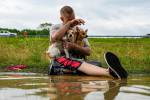Trauma Intervention Program volunteers help at scenes of deaths, accidents
When Dr. Jim Preddy recalls the night he was called to the scene of his 43-year-old mother’s suicide in 1997, he always remembers how he stood outside the house where his mother took her own life and talked with a stranger for hours.
He wasn’t an emergency room physician for University Medical Center then, just a University of Nevada, Las Vegas student with a dream of a career in medicine — a young man who had seen his registered nurse mother fall into a depression as a result of gambling debts.
“This man showed up right after I did — I had gotten a call about my mother — and at first I thought he was with the coroner,” Preddy said recently. “I said there was no way I could go in the house, that I didn’t want the suicide note, and then he told me he was with the Trauma Intervention Program, a TIP volunteer.”
That information, Preddy said, meant little to him at the time. He had never heard of the organization that the man said tries to help people at difficult times.
“I was confused by everything at the time, but then I realized he was helping me understand what was going on, that he was answering my questions about what the police, the coroner and the mortuary were doing,” Preddy said. “And he was listening to me talk about my mother, let me get my emotions out — he was never judgmental.”
That volunteer, said Jill Bernacki, CEO of the Southern Nevada chapter of the Trauma Intervention Program, was providing “emotional first aid.”
“We’re comforting people, not counseling them,” Bernacki said, stressing that no one should be alone when tragedy strikes.
Clark County Coroner Michael Murphy said TIP’s importance shows itself in the community virtually every day.
“They’re there for families at the worst possible moments they can have — an unexpected or violent death,” he said. “The TIP volunteer comes in and quietly helps people navigate and understand the process. It can easily be overwhelming to deal with first responders, all of whom would like to spend more time with families, but they have jobs to do.
“For many people who’ve recently moved to Las Vegas, they’ve left behind the support system they need at such a time and TIP helps fill that gap.”
Las Vegas has the nation’s largest, busiest chapter of TIP, which is part of a national organization founded in 1985.
In 2013, 77 volunteers from Las Vegas’ TIP chapter answered more than 1,200 calls for service.
First responders call the TIP team to the scenes of homicides, natural deaths, suicides, car accidents and fires. Around the clock, the volunteers’ goal is to be on the scene within 20 minutes.
Besides explaining what is going on, lending a sympathetic ear and handing out a community resource guide that details everything from support groups to phone numbers for airlines, TIP volunteers often help arrange for shelter, food and clothing for survivor victims.
And they help notify other family members about the tragedy; serve as a liaison between the victims, their friends, law enforcement, emergency services and hospital personnel; and provide information about appropriate agencies for ongoing assistance.
From 6 to 9 p.m. May 29, the local TIP chapter holds its Heroes with Heart Fundraising gala at The Orleans. The chapter, celebrating 20 years of services, is honoring emergency responders who go above and beyond in providing compassion to citizens in crisis. To learn more about the evening and how to become a volunteer, visit www.tipoflasvegas.org.
“We need as much help as we can get to keep us going strong,” Bernacki said.
TIP volunteers go through 55 hours of training to gain insight into emotional trauma, the workings of first responders and the resources available to survivor victims. There is also a lengthy educational meeting each month.
Many people become TIP volunteers because of “something in their own lives,” Bernacki noted.
It was that way for Lynda Gallagher, who realized how necessary providing comfort is when her husband suffered a severe head injury after a fall a few years ago.
“All my family was there,” she said. “I couldn’t have handled it without their help. You can’t remember anything. You’re in shock. You can’t be alone then. When I heard about what TIP does, I thought it was something I should do.”
Gallagher, who recently had to leave the organization when family responsibilities became more pressing, was on the scene as a TIP volunteer when a sobbing woman cradled her dead husband in her arms, when the parents of a teen who died of drug overdose first tried to deal with their shattered dreams, the promise of what might have been.
Often, she said, she cried along with those she was comforting.
“It’s part of being human,” she said.
TIP volunteer Elaine Lucero also finds herself in situations where she becomes emotional.
“But that’s all right,” she said, “because it shows that such emotion is OK.”
Lucero was once in a situation where a man’s death prompted different grieving by his wife and granddaughter. The grandmother didn’t want to be in the room when the coroner or mortuary arrived but the granddaughter wanted to see how everybody treated the grandfather she loved.
“She asked me if I would be with her and I agreed,” Lucero said. “And then, when they came for her grandfather, she wrapped herself around me and the tears flowed. She needed to be held at that time and I was like a mom or an aunt.”
Sometimes, Lucero said, situations carry over to her personal life. After she worked with a family whose 4-year-old child died, she found herself either calling or visiting her own grandchildren.
“I feel honored to be able to help people, that they allow me in their personal space at such a difficult time,” said the woman who works in the police department’s records division. “But it’s not for everybody. It is a very, very difficult time for people, many of whom aren’t thinking as clearly as they’d like.”
Preddy wishes he could remember the name of the TIP volunteer who helped him.
“I didn’t realize until much later how important he was to me getting through that night,” the physician said. “I know he introduced himself but I can’t remember it and the records aren’t clear.
“I’m on the advisory board of TIP now trying to pay the organization back for caring about my mother and me. I’ll never forget that.”
Contact reporter Paul Harasim at pharasim@reviewjournal.com or 702-387-2908.




































